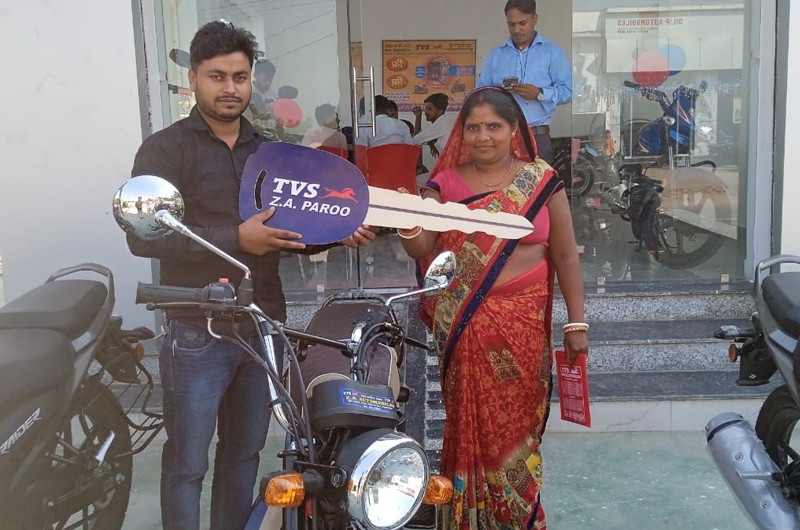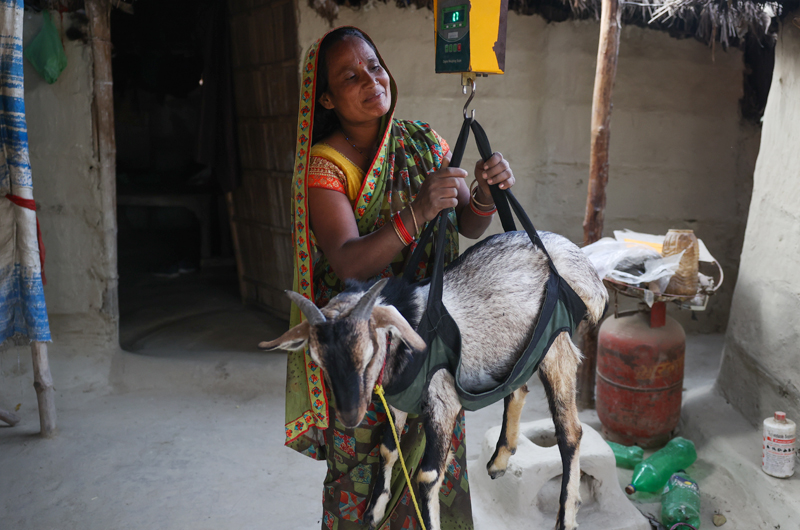More than 100 pashu sakhis or women goat doctors have become lakhpatis (millionaires) in one of Bihar’s aspirational districts — Muzaffarpur. It has been a tough journey to economic empowerment for these women, the majority of who have not even passed their 10th class and were married off at a young age. Usha Rai has the story
Their new status as lakhpati pashu sakhi didis (didi is an older sister) is reflected not only in their broad smiles and the newly acquired self-confidence in their gait but in their recently built homes, the two wheelers they are whizzing around in and the better schools their children are going to. Rehana Khatun of Narsinghpur Village hugs a goat, the icon of her upward mobility, as she announces with pride that her son is doing BTech in a college in Gwalior. Lakhpati pashu sakhis Krishna and Rehana were recently in Delhi, participating in an international conference, ‘Towards just and resilient agri-food systems’.
It all started in 2016 when the Aga Khan Foundation started Project Mesha with the vision of transforming the lives of 70,000 women self-help groups in seven blocks of Muzaffarpur through goat rearing. Though rural homes in Bihar had goats, they were not well tended and the mortality rate was high. Project Mesha ensured better health management, improved feed practices, bigger herds and better value for the fattened goats. Pashu sakhi or para vets were an important component of Project Mesha and they were specially groomed for goat rearing, providing herbal remedies and better understanding of various ailments in ruminants.
Over 350 pashu sakhis have emerged as entrepreneurs within their communities. Initially they were earning just Rs 3,000 a month, but today about a third of them earn over Rs 100,000 annually, providing fee-based preventive health services like vaccination, deworming, castration of male kids, sale of improved feed mixture and goat housing. The pashu sakhis also identify breeding bucks and facilitate access to markets for remunerative sales. Inspired by the success of AKF’s pashu sakhi programme, the Bihar Government is expanding it to other districts of Bihar under its Jeevika (livelihood) project.
Quite recently, the Mesha Mahila Bakripalak Producer Company has been formed strengthening the goat value chain. There is a four-fold increase in earnings from goat rearing. The size of the goat herd per family has increased from 3.72 to 5.9 and goat mortality is down to 20 per cent from 42 per cent. Project Mesha has facilitated goat sales worth Rs 2.23 crores in the 10 months of this year (2023).
Krishna Didi of Sarmastpur Village is the most educated of the pashu sakhis. She is a graduate and returned to her village from Delhi when her husband, a migrant labour, fell ill. Though she had no family support, being a great fighter she built herself a hut and started earning by sewing and raising posia goats (other people’s goats that she nurtures and shares the profits of their sale as well as multiplication). She even pawned her jewellery to provide medicines for her husband. Her life changed when she was identified and trained by the AKF to become a pashu sakhi in 2016. She worked diligently and today she looks after the health management of about 1,200 goats. In addition, she makes and sells goat feed and has a nursery of vegetable seedlings. Her monthly earnings are Rs 8,000 to Rs 10,000. She has got back the jewellery she had pawned and has contributed to the construction of a pucca (permanent) house. “It is wonderful to be recognised in the village and affectionately called ‘our goat doctor’,” she says.

The story of 40-year-old Baby Devi of Paroo Mathiya Village, Paroo Block of Muzaffarpur District, is even more impressive. Though she became a pashu sakhi only in 2021, her growth has been phenomenal. Providing medical health services to 150 goat rearing households, her income rose steadily and she sent her children to private schools, bought a refrigerator and a sowing machine. In May this year (2023), she earned Rs 10,908 and her ambition to spread her wings and soar grew. She bought a scooter for Rs 75,000 to become a mesha udyami or wholesale supplier of herbal medicines, feed mixture, and vaccines for goats to pashu sakhis spread over a larger area. She also wants to upgrade her skills to serve large ruminants. With remarkable ability to fight challenges she divorced her first alcoholic husband and married again. He, too, had a physical disability and initially did not support her working outside the house as a pashu sakhi. Today, Baby Devi is the breadwinner of the family and an icon for her village.

Rehana Khatun, too, has emerged as a fighter. She became a pashu sakhi in 2017 and took the role of breadwinner when her husband, a construction worker, became visually challenged. “At first I cried and ate only roti and salt. Eid would come and go and I could not buy new clothes for my children. Becoming a pashu sakhi has transformed my life.” Her monthly earnings surpassed Rs 10,000 and she is a respected member of her village. Her expertise as a pashu sakhi is reflected in her personal herd of 18 goats. Her sense of pride comes through when she talks of her son doing BTech from Gwalior.
(The writer is a veteran journalist who has worked with The Times of India, The Indian Express and the Hindustan Times from Delhi. A recipient of the prestigious Chameli Devi Award, she was a pioneer in reporting on women’s issues, health, environment and development. She was assistant director of the Press Institute of India when it was in Delhi. A shorter version of this article has appeared in the Delhi edition of The Statesman.)



 from Webdoux
from Webdoux